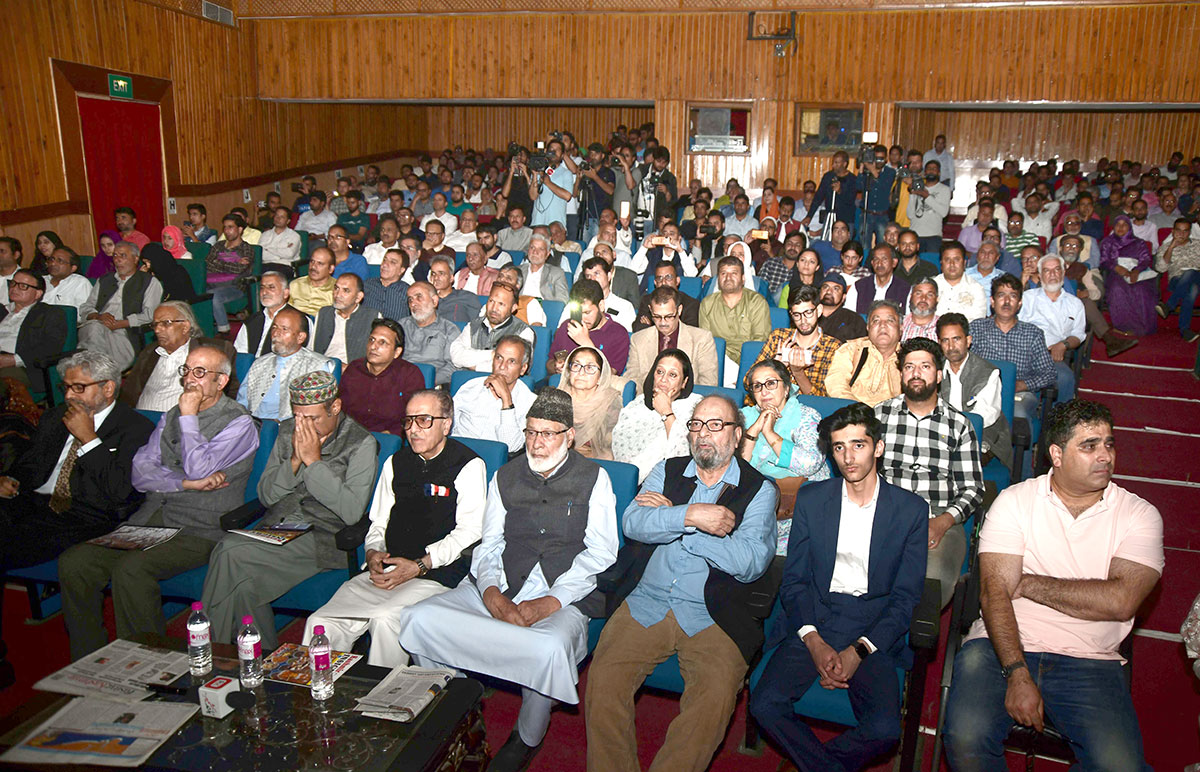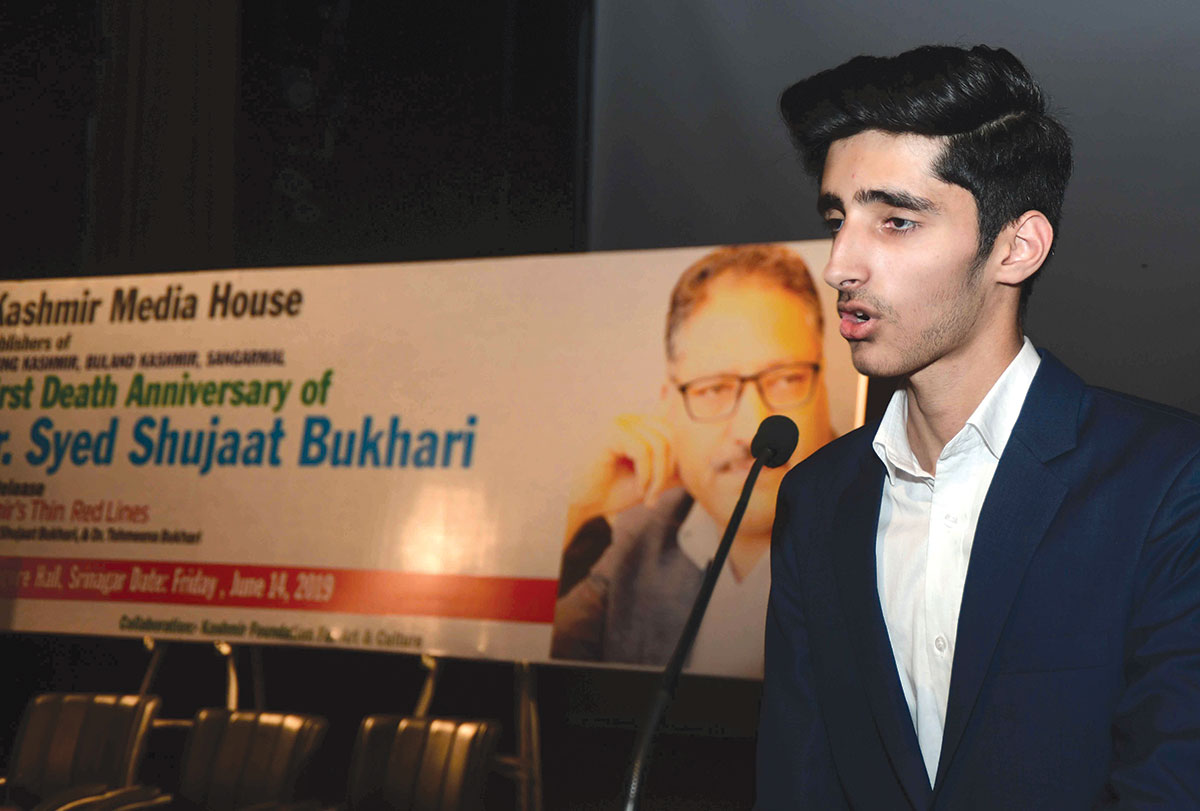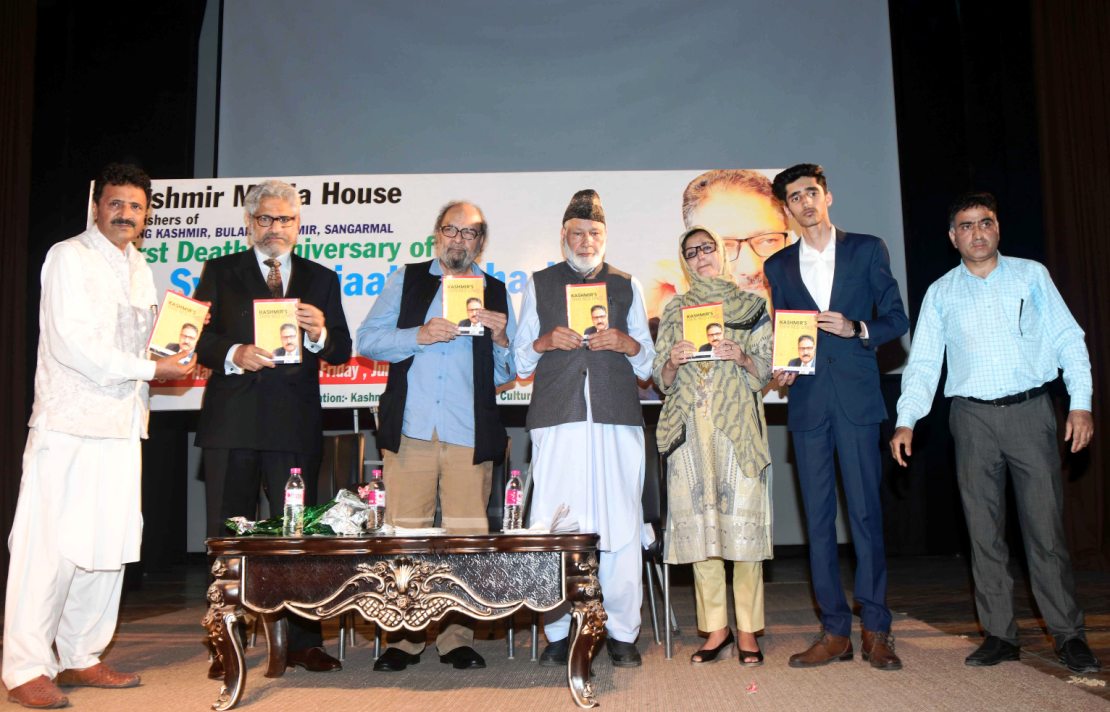On the first anniversary of the assassination of journalist Shujaat Bukhari, Tasavur Mushtaq details why his silence is being felt as never before

Silently stationed, an armoured personnel carrier parked on one end of the entrance to the cluster of the media organizations in Srinagar, known as Press Enclave, is a grim reminder of the June 14, 2018 evening. That evening, when the sun went down and shoppers hurried to finish making the last-minute purchases ahead of Eid-ul-Fitr, the busy street witnessed the chaos. A sound created deafening silence. Nobody could make an exact assessment. Some took it as “fireworks” while others thought of a possible Fidayeen attack.
Minutes later, the sight of a bullet-ridden SUV at the corner revealed the shock; Rising Kashmir’s editor and renowned journalist, Syed Shujaat Bukhari was sprayed with dozens of bullets along with his two bodyguards. Well-built Bukhari was lying in a pool of blood. His colleagues who reached the spot could not gather the courage to see him. They had to shout for help. His journey to the hospital was a formality. He and his two guards were dead the moment they were fired upon by three assailants. Apparently, the assassins left only after they were sure they hit the target.
One of the most recognizable faces in Kashmir journalism and respected across the globe for his ideas and understanding, his funeral reflected his persona. The Kreeri village, his ancestral home, witnessed a sea of mourners. The intensity of the mourning amid rains on the first day and later for many following days was matching with the public’s respect for him. A year later, the memories had not faded as his friends and colleagues ensured they attend the jam-packed Tagore Hall where Kashmir’s Thin Red Line, a book based on his writing, was released. Renowned journalists Siddarth Varadarajan and Sayeed Naqvi delivered lectures in his memory.
Known for his reach and network, a resourceful Bukhari, was well-connected and a wonderful socialite. His ability to strike a chord with a diverse range of people across the geographies had no match among his colleagues. He had an extraordinary quality to get along with all those people he came into contact with.
Professional par excellence, his versatility was his asset. His competence was to deal with challenges, differently and diligently. Starting his journey as a reporter recording the ground details, he later became an insightful editor, meticulous manager, popular publisher, outstanding orator, credible columnist, and peace propagator. Shujaat was someone who audaciously advocated for peace.

His manners and memory, soft-spoken skills, strong and saner voice, and reasonable responses made him a familiar face on TV screens, international seminars, cross-continental conclaves, civil-society discussions and think tank deliberations. Widely travelled, his focus remained on building bridges. A key figure in the politics and geopolitics surrounding Kashmir and the subcontinent, his opinions were valued across the spectrums.
Shujaat was a cultural crusader. A linguistic nationalist, he spearheaded the movement to revive the Kashmiri language as head of the cultural group, Adbee Markaz Kamraz. His efforts yielded results in 2008 when after a gap of over three decades, the Kashmiri language was back in the classroom. He was champion of Kashmir’s culture and made personal efforts to help the languages, otherwise at the verge of extinction in public space. Despite being busy with the three publications he owned Rising Kashmir (English), Buland Kashmir (Urdu) and Sangarmaal (Kashmiri), he ensured proper attention to the cultural events and helped local writers to sustain and establish an identity worth appreciation.
Sensitive to the pain of fellow human beings, Shujaat many times turned out to be a great saviour. Remember the floods of 2014, when the valley witnessed the worst. He took a few of his colleagues along and established the rescue team. Rowing inflatable boats himself, his presence amid disastrous deluge was reassuring. He helped many families to come out of marooned houses and provided essentials to others in need.
A year later when we look back over the days that have gone without him, his absence has affected the fraternity. His silence has made a significant impact. He was a voice, known and knowledgeable. Wonderfully well-informed, he knew the art of articulation. He presented the case of Kashmir. We may have better writers than him behind the curtains, but he inarguably was the face of Kashmir.
As we go through difficult days of managing the red line, which Siddarth Varadarajan said are two – one that writers draw for themselves and the other that others in power draw for us, he is being deeply missed. He had that aura of fighting the case against the odds. “Media should not be seen as an enemy in a democratic setup. Stifling the media does not help to strengthen the democracy that has been under threat in Kashmir for such a long time,” he believed.
Reiterating his commitments to build the peace constituencies and record the events for posterity, even after being threatened, Shujaat valiantly faced the campaigns ran against him.
The day he was killed, one among his last tweets was, “In Kashmir, we have done journalism with pride and will continue to highlight what happens on the ground.” This was probably in response to the smear campaign run against him in a seminar organized in Delhi.
A tall, well-built, bespectacled man with a warm smile and a husky voice, Shujaat had his own signature style. His presence in the press colony was felt. His absence is painful too. His gait and glamour, smile and sensitivities, dress and demeanour, elegance and eloquence, when coming to the mind, smoulders the heart.
Personally, he was someone who had his heart at its right place. Empathetically engaging, he was honest and helpful. His friends remember him as someone who would never miss an opportunity to celebrate their happiness or console their loss. They say he was Mr Dependable under all circumstances. He was gifted, the way he remembered the people and their peculiarities.
A gentleman, Shujaat was known for his hospitality. When Andrew Whitehead, a former BBC India correspondent, paid tributes to the slain editor, he remembered him as someone who “epitomized Kashmiri hospitality”. With an infectious smile and indomitable spirit, he had a knack of making friends, everywhere.
Shujaat knew the costs of his profession, as well, as he dodged death thrice before finally succumbing to at least sixteen bullets. He himself reported for BBC in 2016: “Threats to life, intimidation, assault, arrest, and censorship have been part of the life of a typical local journalist.”
Shujaat was vocal in his expression. He was confident and courageous. When he reported for BBC in July 2016, he was categorical in saying, “Journalists have been targeted by security forces and militants alike.”
Undeterred by being demonized, his fearlessness became a reason for his killing, as well. He wore his ideas on his sleeves and did not budge. His articulation, analysis and writing gained him many enemies- across the ideological divide. His personality of being a blend of brilliance and sanity led to the ruffling of feathers somewhere. Peace activist at heart, Shujaat continued to discuss ideas, fearlessly.
Moments after his last tweet, which was about the United Nations General Assembly overwhelmingly passing a resolution condemning Israel for clashes along the Gaza border, Shujaat was shot multiple times and silenced forever. Hours later, the UN tweeted out that it was “terribly saddened by the death of Shujaat Bukhari”.
As his killing was condemned by all across the political ideologies and geographies, police swung into action and established Special Investigation Team (SIT). SIT asserted that the Pakistan based Lashkar-e-Toiba (LeT) was responsible and identified the accused. Later they were killed too. But LeT refused the police version and denied the involvement. For police, the case seems to be closed.
However, the conspiracy is still a mystery. With every passing day, there are more questions about his assassination than the answers so far put in the public domain.
The only credible action taken after his assassination was placing an APC and huge CCTV cameras outside the spot of his murder. The presence of vehicle reminds of the slain editor, however, poses continuous questions, “What did the killers achieve. Why he was killed?
Lying deep down the grave in Kreeri, Shujaat who had just seen fifty springs of his life before elapsing to the other world continues to live, peacefully. The regret is the way he was killed, brutally in the prime of his life. His thoughts continue to lead the way, but his efforts were required to help this world live more, peacefully.

A strong votary of dialogue and reconciliation, Shujaat remained a unifying force all a withlong his life. Even in his death, he reunited the people across different ideologies.
However, the sun which had set on the evening of June 14, 2018, never rose again. The hope which resurrected on the day of his heart attack in December 2015 did not repeat the magic on the day of his killing.
May his soul rest in peace!















